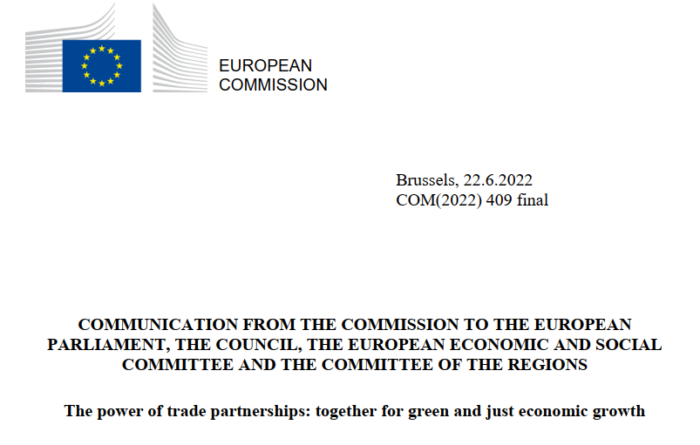
The European Commission presented on 22nd June a new approach to EU trade agreements to promote green and fair growth; an important step towards making EU trade greener, fairer and more sustainable with a focus on climate protection, the environment and workers’ rights worldwide.
The EU is firmly committed to ensuring that EU trade agreements promote sustainability, so that economic growth goes hand in hand with the protection of human rights, decent work, climate and environment, in full respect of EU values and priorities. The approach is based on international labour and environmental standards through transparent structures and processes, with the involvement of civil society.
In its communication ‘The power of trade partnerships: together for green and fair economic growth’, the Commission proposes how to further strengthen the implementation and enforcement of the trade and sustainable development (TSD) chapters of EU trade agreements. In order to make trade more sustainable, enforcement will be intensified and sanctions will be used if core labour and climate commitments are not met.
All modern EU trade agreements include chapters on trade and sustainable development, with a broad set of mutually agreed commitments. The EU Commission’s Communication identifies key policy priorities and action points, which will further strengthen the effectiveness of the existing TSD (Trade and Sustainable Development) commitment approach.
The new approach will include the use of trade sanctions in the event of violations of key TSD provisions. It will be applied to future and, as the case may be, ongoing negotiations. In particular, the new approach to TSD covers the following aspects: results-oriented and priority-based engagement with partner countries.

The Commission will:
- negotiate tailor-made targets and roadmaps with partner countries for more effective results;
- intensify engagement with trading partners in a cooperative process to promote compliance with international labour and environmental standards, including through technical and financial assistance;
- work closely with both Member States and the European Parliament to monitor and implement TSD commitments;
- work to open new markets for the import and export of green goods and services and raw materials, which is particularly important to reduce dependencies in the current geopolitical climate.
The European Commission also strives to ‘make it easier for civil society and national advisory groups (ICGs or DAGs) to submit complaints about breaches of sustainability commitments‘. There will be a general rule for dealing with TSD complaints through an update of the Operational Guidelines for the Single Entry Point; DAGs will be more involved in technical assistance projects and meetings with EU Member States. The EU will ensure greater transparency on the work of the DAGs, including the publication of lists of participating organisations.



































